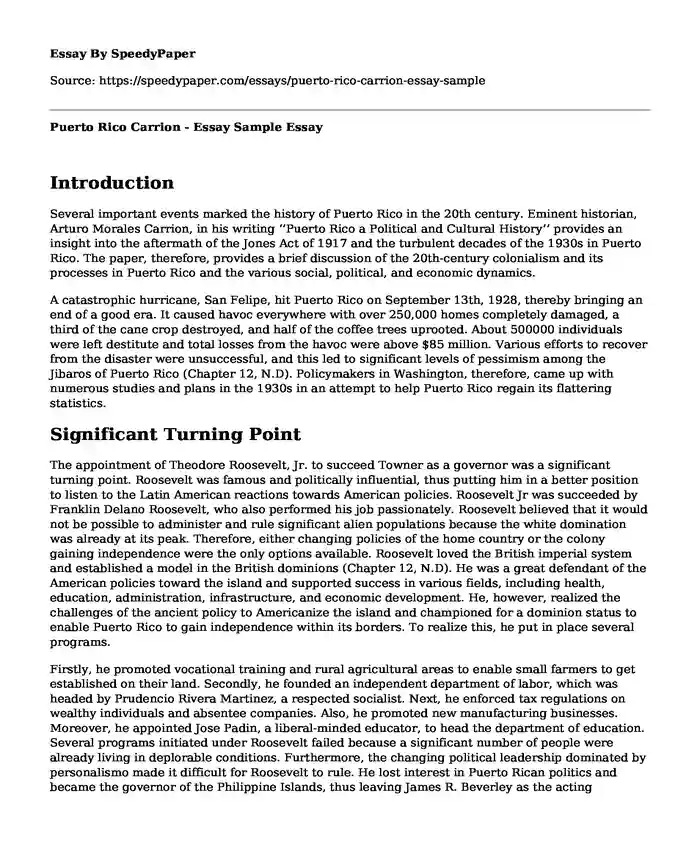Introduction
Several important events marked the history of Puerto Rico in the 20th century. Eminent historian, Arturo Morales Carrion, in his writing ‘’Puerto Rico a Political and Cultural History’’ provides an insight into the aftermath of the Jones Act of 1917 and the turbulent decades of the 1930s in Puerto Rico. The paper, therefore, provides a brief discussion of the 20th-century colonialism and its processes in Puerto Rico and the various social, political, and economic dynamics.
A catastrophic hurricane, San Felipe, hit Puerto Rico on September 13th, 1928, thereby bringing an end of a good era. It caused havoc everywhere with over 250,000 homes completely damaged, a third of the cane crop destroyed, and half of the coffee trees uprooted. About 500000 individuals were left destitute and total losses from the havoc were above $85 million. Various efforts to recover from the disaster were unsuccessful, and this led to significant levels of pessimism among the Jibaros of Puerto Rico (Chapter 12, N.D). Policymakers in Washington, therefore, came up with numerous studies and plans in the 1930s in an attempt to help Puerto Rico regain its flattering statistics.
Significant Turning Point
The appointment of Theodore Roosevelt, Jr. to succeed Towner as a governor was a significant turning point. Roosevelt was famous and politically influential, thus putting him in a better position to listen to the Latin American reactions towards American policies. Roosevelt Jr was succeeded by Franklin Delano Roosevelt, who also performed his job passionately. Roosevelt believed that it would not be possible to administer and rule significant alien populations because the white domination was already at its peak. Therefore, either changing policies of the home country or the colony gaining independence were the only options available. Roosevelt loved the British imperial system and established a model in the British dominions (Chapter 12, N.D). He was a great defendant of the American policies toward the island and supported success in various fields, including health, education, administration, infrastructure, and economic development. He, however, realized the challenges of the ancient policy to Americanize the island and championed for a dominion status to enable Puerto Rico to gain independence within its borders. To realize this, he put in place several programs.
Firstly, he promoted vocational training and rural agricultural areas to enable small farmers to get established on their land. Secondly, he founded an independent department of labor, which was headed by Prudencio Rivera Martinez, a respected socialist. Next, he enforced tax regulations on wealthy individuals and absentee companies. Also, he promoted new manufacturing businesses. Moreover, he appointed Jose Padin, a liberal-minded educator, to head the department of education. Several programs initiated under Roosevelt failed because a significant number of people were already living in deplorable conditions. Furthermore, the changing political leadership dominated by personalismo made it difficult for Roosevelt to rule. He lost interest in Puerto Rican politics and became the governor of the Philippine Islands, thus leaving James R. Beverley as the acting governor.
Conclusion
In summary, it is evident from the above discussion that several significant social, political, and economic events marked the history of Puerto Rico in the 20th century. The deplorable state of the economy due to the San Felipe hurricane made it necessary to formulate relevant policies to rescue the island from exploitation. The United States could develop proper economic and social strategies, but the latter could hardly be achieved. The 1930s generation was more assertive and analytical and would more often than not resort to revolutionary means to gain independence.
Reference
Chapter 12. (N.D). The Plight of the 1930s.
Cite this page
Puerto Rico Carrion - Essay Sample. (2023, Dec 12). Retrieved from https://speedypaper.com/essays/puerto-rico-carrion-essay-sample
Request Removal
If you are the original author of this essay and no longer wish to have it published on the SpeedyPaper website, please click below to request its removal:
- Essay Example on Socioeconomic Mobility in UK
- Rich's Essay - Sample of a Stylistic and Thematic Review
- Essay Example: Social Constructionist Approaches
- "Reflection on the End of Racial Representation" Chapter Discussion Essay Sample
- American History Essay Example: Slavery and Civil War
- Paper Example. Abuse in the Shining
- Achievements of the Tang and Song Era - Free Essay Example
Popular categories





